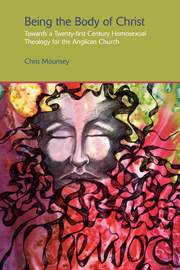Book contents
- Frontmatter
- Contents
- Introduction: Homosexuality and Anglicanism
- PART I
- PART II
- 6 Edward Carpenter: Towards Democracy – The Greatest Poet England Never Had
- 7 Alan Hollinghurst: The Swimming-Pool Library – The Belle Époque of a Prodigal
- 8 Jeanette Winterson: Lighthousekeeping and The PowerBook – The Theology of the Body
- Conclusion: Blindness and Insight – Some Reflections
- Select Bibliography
- Subject Index
- Author Index
7 - Alan Hollinghurst: The Swimming-Pool Library – The Belle Époque of a Prodigal
from PART II
- Frontmatter
- Contents
- Introduction: Homosexuality and Anglicanism
- PART I
- PART II
- 6 Edward Carpenter: Towards Democracy – The Greatest Poet England Never Had
- 7 Alan Hollinghurst: The Swimming-Pool Library – The Belle Époque of a Prodigal
- 8 Jeanette Winterson: Lighthousekeeping and The PowerBook – The Theology of the Body
- Conclusion: Blindness and Insight – Some Reflections
- Select Bibliography
- Subject Index
- Author Index
Summary
As with most of the other novels that are explored in this book, little has been written on Alan Hollinghurst except for his Booker Prize winning The Line of Beauty (2004), but what has been written on the Swimming-Pool Library (1988) concentrates on the Queer and Post-Colonial theories of interpretation. Papers by David Alderson, Thomas Dukes and Brenda Cooper, for example, use recognizably Foucauldian strategies, and Dukes and Cooper read Eve Sedgwick's Epistemology of the Closet (1990) back onto Hollinghurst's earlier text.
While the readings these critics give are useful in showing the developments of Queer Theory, Gender Theory and Post Colonial Theory through the 1990s, only Alderson makes contextual references that intersect with the methodology of the present chapter. The title of his paper, ‘Desire as Nostalgia’, draws a useful link between sexuality and history, but his paper misprises the novel as being at heart homophobic. Writing of history of the laws on homosexuality, Alderson suggests:
There is no question that Hollinghurst indicts the legal proscription of male same-sex desire – this is one of the more obvious “messages” of the novel – but that does not mean that the past is in every way denigrated: rather, the sexual liberties of the present are in many ways presented as a violation of older ideals.
- Type
- Chapter
- Information
- Being the Body of ChristTowards a Twentieth-Century Homosexual Theology for the Anglican Church, pp. 164 - 197Publisher: Acumen PublishingPrint publication year: 2012



